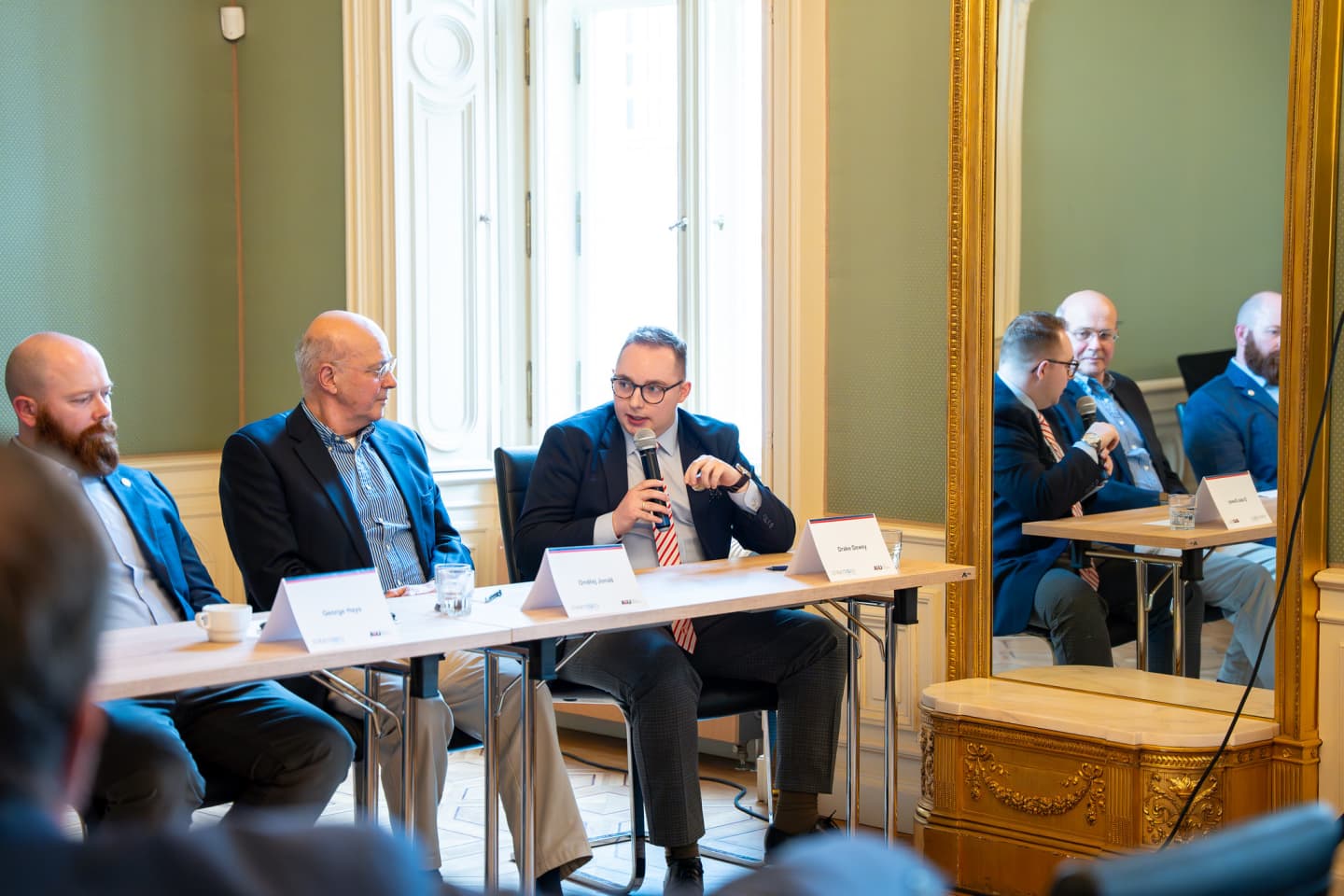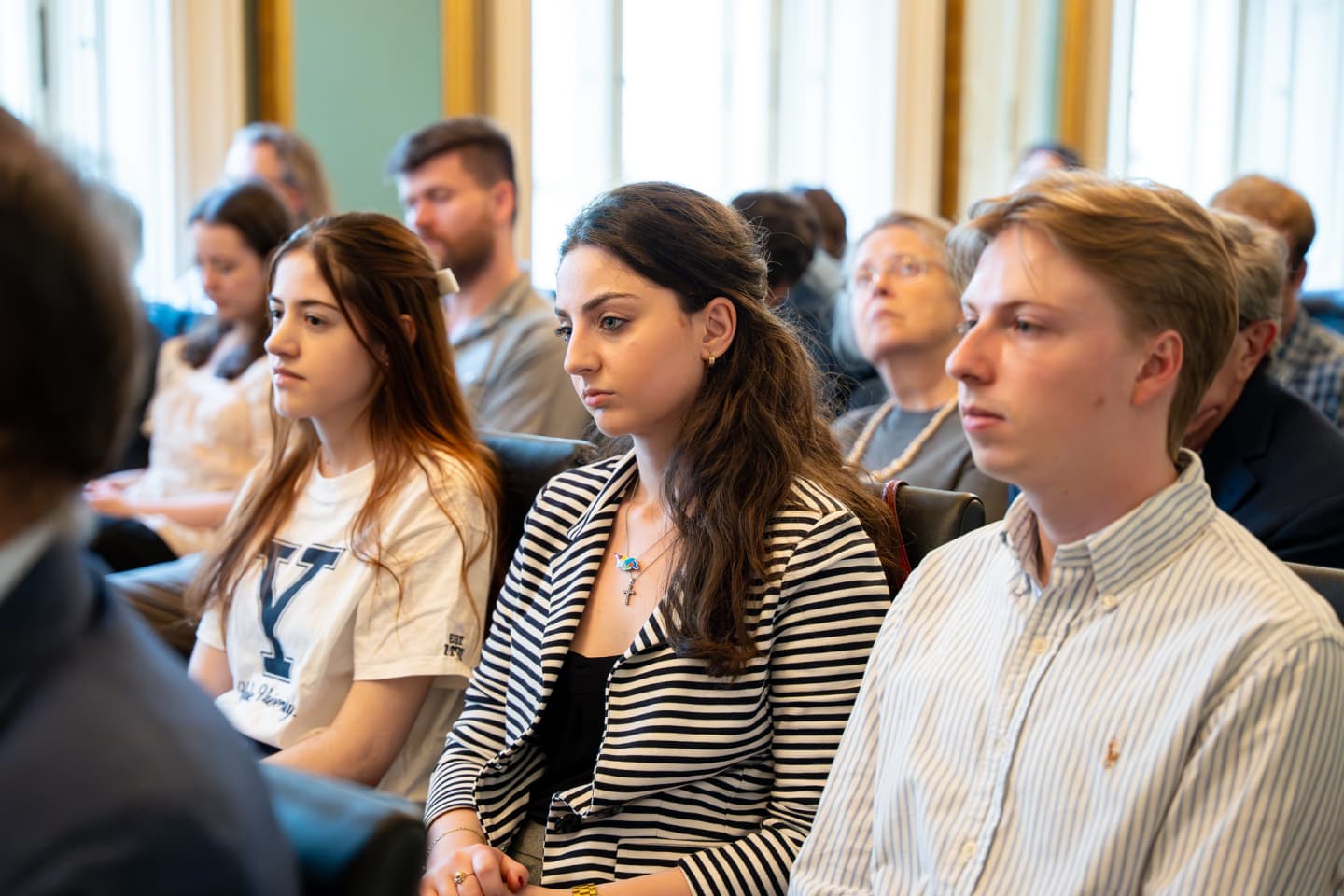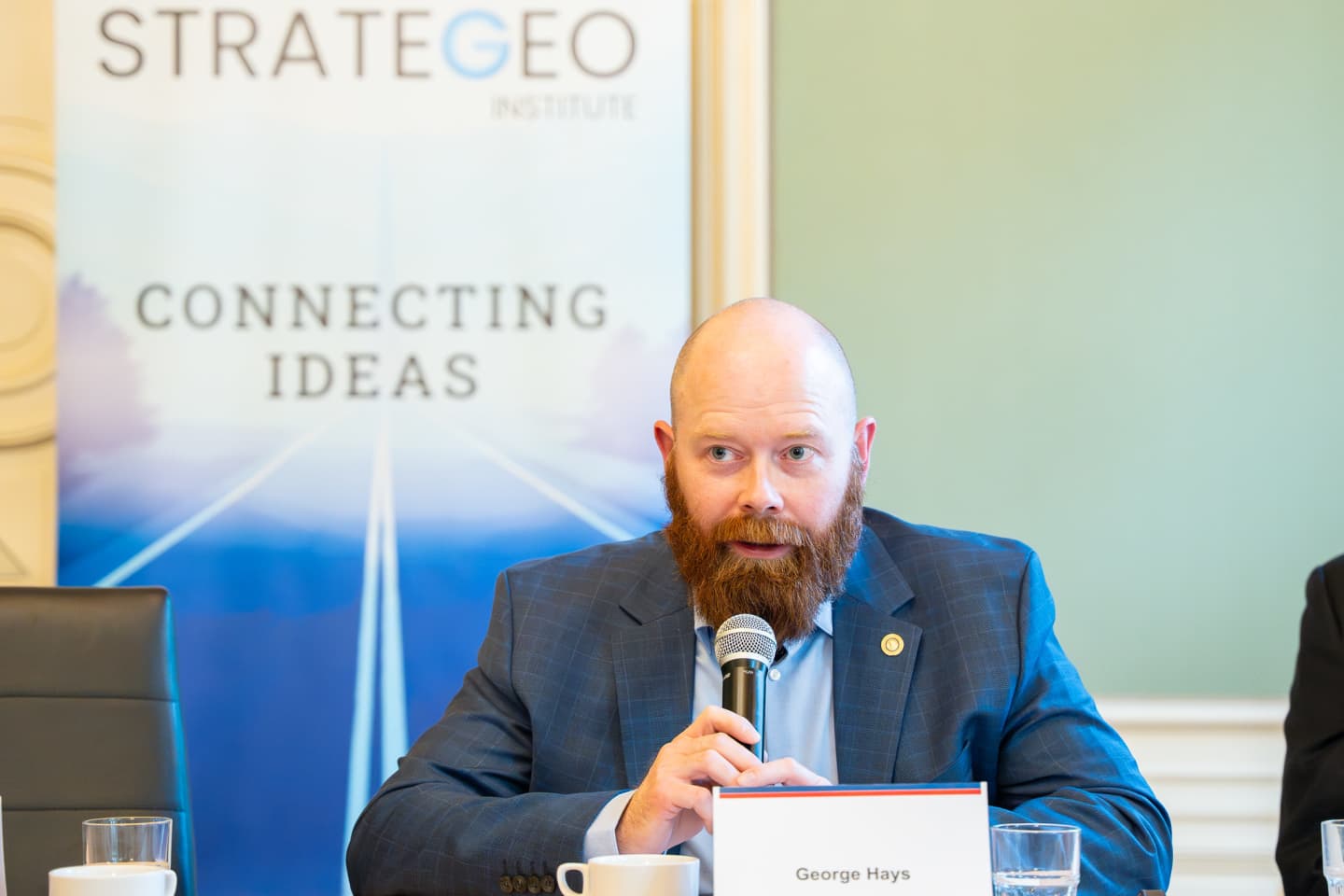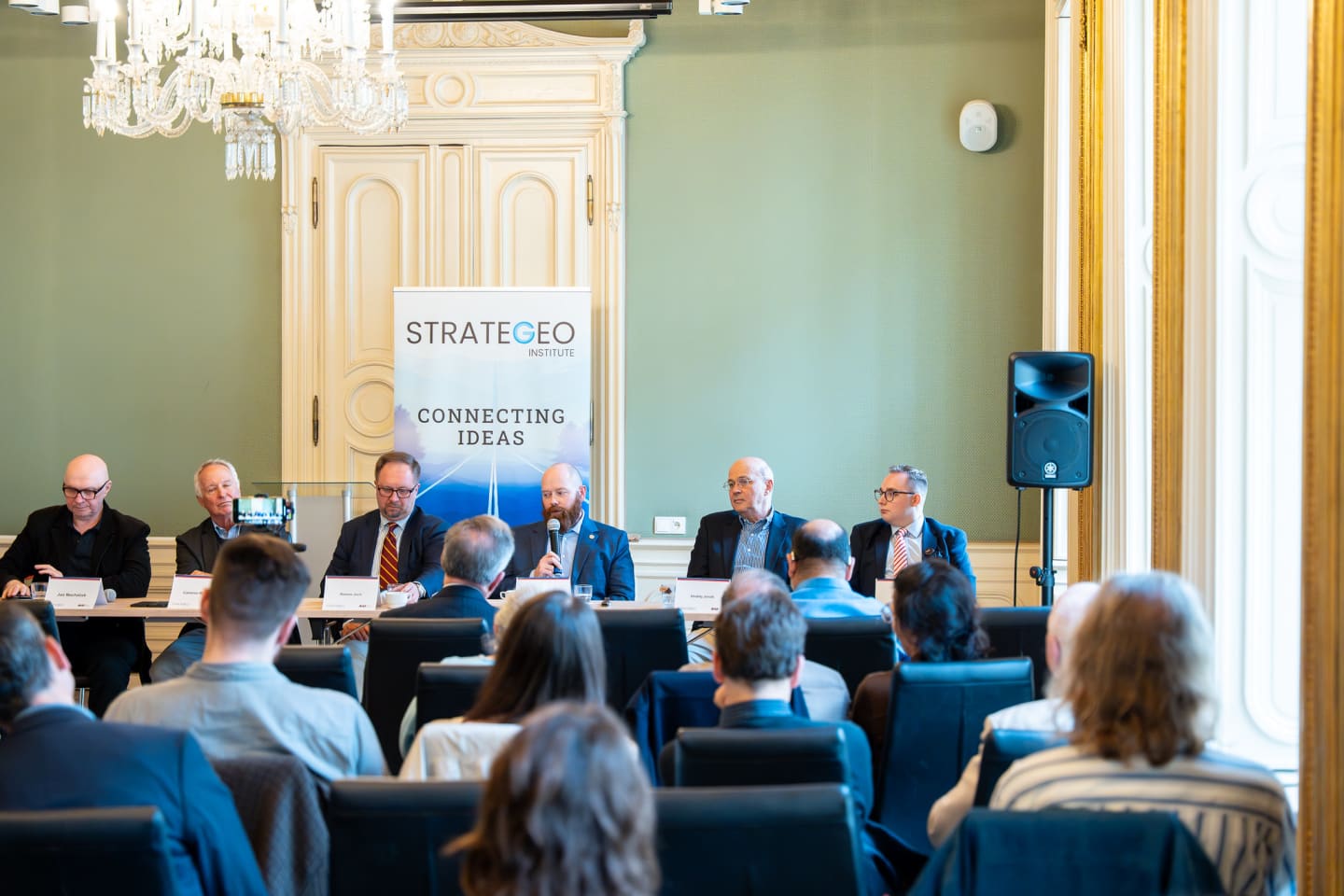AAU Hosts Debate on the Future of Transatlantic Ties

On April 15, 2025, Anglo-American University (AAU), in cooperation with the Strategeo Institute, hosted a public debate on the future of transatlantic relations. Titled Atlantic Relations in Crisis, the discussion brought together a varied panel of experts to examine developments in relations between Europe and the United States. The event addressed key issues related to trade, military cooperation, and democratic governance.
The debate was moderated by Jan Macháček, president of the Strategeo Institute, and featured the following panelists:
- Amb. Cameron Munter – former U.S. diplomat and ambassador
- Dr. George Hays – lecturer at Anglo-American University
- Roman Joch – director of the Civic Institute
- Ondřej Jonáš – Czech-American investor
- Drake Dewey – graduate of AAU’s M.A. in International Relations and Diplomacy
Economic Disruption and the Return of Tariff Politics

The discussion opened with an examination of U.S. tariff policy. Panelists addressed the inconsistent rationales presented for tariff implementation, which included geopolitical leverage, federal revenue generation, and efforts to correct trade imbalances. The absence of a coherent long-term strategy was identified as a key concern.
Protectionist views were described as a long-standing feature of the current administration’s outlook. Tariffs were said to have been applied across numerous sectors, resulting in increased consumer costs and disruptions in global supply chains. The motivations behind trade decisions were characterized as rooted more in discretionary authority and political signaling than in structured economic planning.
The role of President Donald Trump in shaping current U.S. trade policy was discussed extensively. Panelists noted that Trump has publicly supported tariffs for decades and has repeatedly cited them as both an economic tool and a campaign promise. His administration’s use of tariff measures was described as unpredictable, with frequent shifts in scope and exemptions.
Legal justifications for the use of tariffs were also reviewed. Panelists cited the 1977 International Emergency Economic Powers Act as a legislative mechanism that allows broad executive action in the area of trade. The potential for congressional reform to limit these powers was discussed. Attention was also given to corporate lobbying, the granting of exemptions, and the challenges faced by smaller businesses navigating rapid policy shifts.
Market responses to the announcements of tariffs, such as stock volatility and rising interest rates, were reviewed in detail. Some participants linked these developments to broader concerns over national debt, annual fiscal deficits, and the long-term status of the U.S. dollar as the world’s primary reserve currency.
Audience questions prompted discussion of corporate influence and the possibility of conflicts of interest, while panelists addressed the potential implications of selective policymaking based on political or financial considerations.
NATO, Defense Cooperation, and Strategic Autonomy

The conversation then shifted to matters of collective security and the future of NATO. Panelists considered whether the alliance could maintain its relevance and credibility in the face of growing tensions and changing U.S. priorities.
NATO was described as more than a military institution, with emphasis placed on the psychological trust underpinning Article 5. The reliability of mutual defense commitments was debated, particularly in light of rhetoric from Trump suggesting conditional U.S. involvement. Concerns were raised about the long-term effects of such messaging on European confidence in collective defense.
Panelists discussed a divide between the U.S. military establishment and civilian leadership, noting that senior military officials have continued to support traditional alliances even as political leaders adopt more unilateral or conditional approaches. European efforts to pursue greater strategic autonomy were discussed, though it was noted that most EU member states remain reliant on American logistical and defense infrastructure.
Historical patterns of uneven defense spending were cited as contributing to the current imbalance in NATO. Panelists raised the possibility that European countries may need to independently deter regional threats in the future. Germany’s evolving defense strategy was identified as a possible turning point in European security, alongside speculation about future nuclear capabilities in countries such as Poland.
The discussion also covered limitations in current European air defense systems and military readiness, with panelists indicating that meeting new security expectations would require sustained investment and policy alignment.
Values in Question: Democracy, Free Speech, and Political Identity

In the next portion of the debate, attention turned to democratic governance and political values. Panelists reviewed developments in U.S. domestic policy, particularly those affecting higher education, civil liberties, and public discourse.
Examples were cited of federal efforts to influence university policy, including through funding mechanisms and public criticism of institutional culture. These developments were discussed in the context of free speech protections, administrative autonomy, and political partisanship.
Panelists compared government rhetoric with public attitudes, noting differences between leadership actions and the broader values held by many citizens in both Europe and the United States. The extent to which recent policy shifts have influenced perceptions of U.S. democratic institutions was examined, with some discussion focusing on the role of Trump’s administration in reshaping institutional norms and popular expectations of governance.
Discussion also included speculation about whether Europe may seek closer economic or strategic ties with other global actors, particularly China, as a response to unpredictability in the transatlantic partnership. The consequences of prioritizing predictability over shared ideological values were assessed.
Panelists also examined political engagement among younger generations, linking it to broader trends such as electoral law changes, voter identification requirements, and political polarization. These factors were said to influence participation rates and public trust in democratic institutions.
Global Repositioning and the Road Ahead

The concluding segment of the event focused on emerging global alignments. Audience questions prompted discussion of China’s expanding influence in Latin America and the perception of U.S. disengagement in that region. Panelists contrasted China’s infrastructure investments with the more confrontational posture adopted by the United States in recent years.
Whether Europe could or should play a more active role in Latin America and the Global South was considered in relation to internal challenges within the EU. Barriers to deeper economic integration and foreign policy coordination were noted as limiting factors.
The conversation also addressed China’s strategic posture. Panelists described China’s international behavior as long-term oriented and cautious, particularly when compared to the more reactive approach of other major powers. Russia’s future actions and its relationship with the U.S. were discussed as variables with potential implications for regional and global stability.
Other topics included shifting global perceptions of the U.S., travel advisories issued by allied countries, and the influence of domestic political developments on international reputation. The debate concluded with an open Q&A session, where audience members raised questions on issues ranging from corruption and civil society to shifting alliances and geopolitical priorities.
The debate formed part of an ongoing series of public discussions jointly organized by AAU and the Strategeo Institute. Upcoming debates are expected to continue examining key developments in global politics, security, and democratic governance.
More photos from the Trans-Atlantic relations debate can be found here.
Articles on Past AAU-Strategeo collaborations:
Founded by former dissident Jan Macháček with the aim of advancing the values of classical European liberalism, the Strategeo Institute focuses on the areas of geopolitics, diplomacy, security, economics, energy, and international trade, among others. By fostering dialogue among leaders from political, economic, and media sectors, Strategeo aspires to address Europe’s most pressing issues and provide actionable solutions.
Anglo-American University (AAU) is an institution of higher learning based in Prague, Czechia. Inspired by the liberal arts traditions of British and American academia, it was established in 1990 and today offers a range of undergraduate and graduate programs across three schools of study. Accredited by both US and Czech accrediting bodies, AAU is diverse, with students from over 80 countries and a culture that prizes critical thinking, effective communication, and personal transformation.